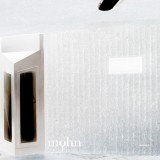Horace Walpole’s The Castle of Otranto, widely considered the first work of gothic fiction, begins with a massive helmet dropping out of the sky and crushing the hapless heir to the lord of the castle, wicked-witch-of-the-East style. As in much English literature before the rise of the novel, it’s a thrillingly alien event, its narrative logic resounding of prophecies, sworn oaths, and alliances long, long ago smashed and put back together a thousand different ways. The sonics of Mohn’s self-titled debut have a similar epochal gravity, all massive fallen objects, eroded edifices, and stone surfaces multiplied by echo. Fifteen years ago, Wolfgang Voigt and Jörg Burger (individual credits too long to list, but most relevant to this review, Gas and Triola, respectively) collaborated as Burger/Ink on Las Vegas, and they have made a smattering of recordings together since then. But their latest collaboration, Mohn (German for poppy), exhibits little of Burger/Ink’s streamlined sound or the primary-colored aesthetic of classic Kompakt. Still flawlessly designed, the duo’s samples on Mohn are built up into crumbling gothic edifices, shot through with cracks and shadows, echoing with a stately ambience that thuds like a giant helmet onto hypnagogia’s retroscape, with its nostalgia measured in the length of generations of obsolete recording technology, by eking out its sound and sonic iconography at level of the decline and fall of empires.
In its damaged grandeur, Mohn is thematically most akin to Voigt’s flawless GAS project. Most GAS tracks were built up out of screwed orchestral and operatic recordings, and Mohn has the same feel, but the 4/4 kick drum that rippled through those GAS albums has crumbled away — though the floor’s dropped out and the gargoyles have flown, the walls still hold. The characteristic sound of this album is the chest-thumping bombast of “Schwarzer Schwan”: lit by portentous claps of percussion, cobwebs catch the light as the single note of an operatic tenor is warped, screwed, wandering the halls of song like a disinherited ghost. In “Einrauschen,” a groaning loop, faraway bells, and a crumbling orchestral sample evoke a glyphic glitch of grinding stone on stone.
The sound design of the album is conventionally breathtaking. Like the castle of Otranto, Mohn is full of secret passageways, its receding samples like disembodied fingers urging you along uncanny vectors. Hallways crisscross “Das Feld,” in which whooshing synths and faraway samples clang and patiently exit the stereo field. On “Ebertplatz 2020,” the samples come and go like long-prophesized meteor showers, and “Seqtor 88” shuffles its samples into a grim march. Loops linger just long enough to imprint upon your short-term memory and then fall away. These are well-worn themes explored over the past two decades of experimental electronic music, but Mohn unimaginably lengthens the scope of its nostalgia from a buzzing anxiety over unrecoverable information to the passing into history of all record of human achievement itself: “Saturn’s” bass throb orbited by sampled bells takes a common IDM trope and makes it monumental. These are bells tolling for thee — massive, resonant, full of the weight of centuries of history. Each song is a castle on the edge of an eroding cliff. This is what’s left of our dreams after the castle has been stormed, after the flags have come and gone: some scar in the earth, some oddly shaped stones, hewn at great expense, the cost to human life, far, far too great.
More about: Mohn

